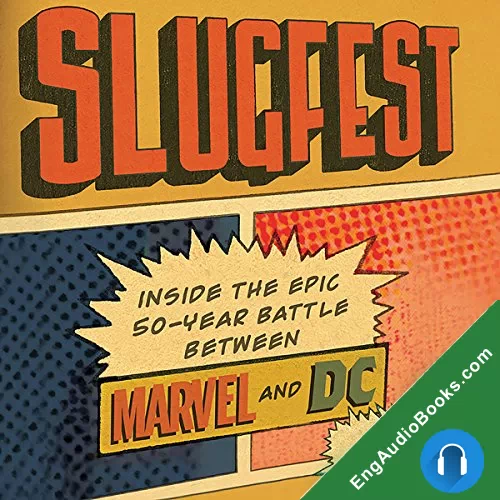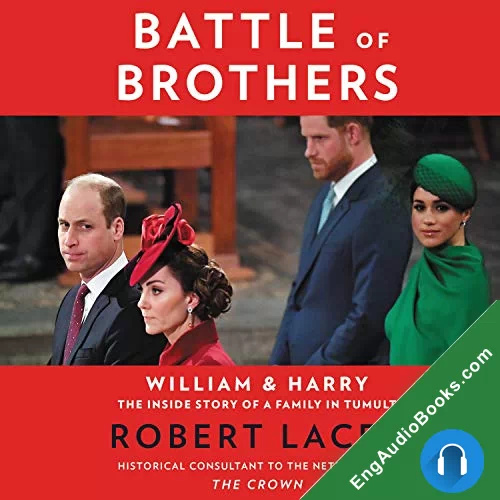Review #1
Slugfest: Inside the Epic, 50-year Fight between Miracle at the same time DC audiobook free
I very much enjoyed this book.
This is that an easy to read book that discusses the rivalry between the two companies at the same time relates it to at the same time outlines their past at the same time located cooperate structure. The creator does not dwell on items very long, such as Marvels bankruptcy where other books have done that. The book is that all text with no illustrations at the same time does not draw in itself the real funny book stories.
For those knowledgeable with the important actions he bestows behind the scenes information at the same time quotes. For those not knowledgeable with the coolest important actions, he discusses them in chronological order.
Miracle, in the 1960s is that, obviously, the favorite in the race. At the moment, from a distance it is that easy to look that the corporate structure of DC, its limited worldview at the same time its inability to change, held back them back. Marvels innovative approach, managed by Stan Lee, allows Miracle grow at the same time get ahead the much bigger competitor in funny book sale promotions. The narrative of DC concentrates on Weisinger at the same time Schwartz, a little on Kanigher at the same time very little on Schiff, although in the 1960s Batman became a bigger deal. Soon the DC narrative shifts to Carmine Infantino. In the later years, Joe Questa at the same time other Miracle higher up do not come out looking quality. At the same time once again, no one has a good word for Weisinger.
I have written about this recently at the same time it is that talked here. First of Marvels rise to fame, DC books seemed for toddlers, they offered few adventures at the same time lots of silly gimmicky covers. Still, in the beginning of the 1960s DC believed themselves as literature at the same time Miracle as, but, garbage. Their dialogue was simplistic at the same time had no features, so at a JLA meeting for you managed move the balloons around it would not matter who misspoke than anyway. These issues were considered gone into carefully in this book. At the same time demonstrate why Miracle defeated the 1960s at the same time 1970, creatively as but as on the shields.
Reed discusses at length the actions that managed Miracle to Hidden Wars at the same time that promote change its corporate structure. He does similar with the Doom Of Superman at the same time Decline at DC, at the same time, once again, indicates how special actions promote circulation, but, later on often hurts it. Apparently, the creator feels to DC has ahead of Miracle creatively, at lesser in the continue couple of decades.
A amazing deal of time is that wasted discusses the inconsistencies setting up the crossover issues, Superman vs. Spider-Man, at the same time how the up at the same time down animosity of the two companies often shield it its method. At once, Reed demonstrate how economically the two companies are somewhat dependent on each other. The creator also discusses why abundance painter left on company to move to one more. Or why an painter or writer would Never move to DC or Miracle.
The creator also lets us in a little on the great salaries at the same time prizes, sometimes a million bucks that favorite creators at the moment get. The book concludes with a examine the movies at the same time the unchanging rebooting of the companies.
I have no dog in this race but I achieved a conclusion a long time ago. Creativity comes from an personal, not a company. Miracle in the 1960s at the same time DC in the 1940s (not hidden here) were considered their almost all creative when privately possessed.
Review #2
Slugfest: Inside the Epic, 50-year Fight between Miracle at the same time DC audiobook streamming online
In “Slugfest: Inside the Epic, 50-Year Fight between Miracle at the same time DC,” journalist Reed Tucker provides a brisk, enticing acc of the ongoing clash of the superhero-publishing titans.
He’s done a fine-grained job portraying two companies traveling parallel tracks: Miracle, the scrappy upstart publisher of all-too-human superheroes that reached longtime industry favorite DC in the premature 1970s at the same time eventually became barely as corporate as its head rival; at the same time DC, the staid corporate publisher with iconic, godlike heroes that’s wasted five-plus decades trying-sometimes successfully, sometimes not-to capture Miracle’s brand of steep by bringing those icons like Superman, Batman at the same time Wonder Lady down to land at the same time making them topical for modern readers.
Tucker introduces his narrative with a vivid acc of a cringe-inducing meeting at DC’s bland Brand new York headquarters in what disturbed executives try to figure out the hidden of Miracle’s success-and concentrate on imitating every superficial nuance of Miracle magazines apart from the storytelling because they rejected to stoop to actually reading those books.
Periodically, the publishers’ fight for spandex supremacy is that as intense-though not as violent at the same time destructive-as anything depicted in their books. Industry personalities hurl defiant schoolyard insults at their employer’s competitor. Those personalities are the objects of giftedness wars as the companies poach each other many times. They imitate, they plagiarize-and even involve in espionage that hews closer to “Get smart” than James Bond. (In 1971, a DC executive left in his outbox a fake memo about publishing 500-page comics. The employee suspected of leaking company riddles to Miracle took the bait-and soon enough, Miracle was talking publishing 500-page comics.)
Obviously, the features who dominates Tucker’s narrative is that Stan Lee, who co-created (with Jack Kirby at the same time Steve Ditko) conflicted, flawed heroes like the Mind-blowing Four at the same time Spider-Man who were considered the antithesis of DC’s idealized, flawless heroes. Tucker offers readers not the idealized “Stan the Men,” but a writer who initially wanted nothing to do with comics at the same time barely wanted to make enough funds to launch a career in more honorable publishing. In effect, Tucker does for Lee than anyway Lee did for superheroes-he humanizes a seemingly larger-than-life figure.
Tucker also makes understandable that comics is that primarily a male-dominated industry; the only ladies’s voices heard in his narrative are those of Jenette Kahn, longtime DC president at the same time publisher, at the same time veteran Miracle writer/editor Ann Nocenti.
Along the method, he also indicates how the comics themselves evolved from cheap, four-color pleasures for babies to more complete fare provided for a fanatically devoted, but aging, audience-and at the moment, to valuable mental qualities for conglomerates like Disney at the same time Warner, respectively.
It’s Tucker’s adore of his topic that makes “Slugfest” such a knockout read.
At the same time “Slugfest” can be enjoyed not just by funny book fans, but also by students of business administration, as Tucker chronicles the shortcoming of business acumen exhibited by editorial regimes at both companies. (Particularly interesting is that the cautionary tale of Carmine Infantino, a renowned painter whom DC woefully miscasts as an executive.)
In the end, Tucker concludes, neither company is that the true favorite of its ongoing rivalry-it’s the kids who read “Batman” at the same time “Daredevil” who grew up to become power players in the movie, broadcast at the same time video-game industries that are the new battlefields for the cape-and-cowl titans.
Review #3
Audiobook Slugfest: Inside the Epic, 50-year Fight between Miracle at the same time DC by Reed Tucker
I believed it was a amazing history of the two companies but it seemed understandable to me that the creator had a very bigger lean toward Miracle. I also prefer Miracle on the whole but he often glossed over no one of the reduce fri in Miracle history. Example: he goes to amazing lengths to sing the praises of Marvels movie success but drives through a 20 year history of scary miracle movies. He goes into specifics around scary DC comics but glosses over the effect of Nolans Batman trilogy.
Its but worth a read but if for you were considered looking for fairness this isnt the best book you.
Review #4
Audio Slugfest: Inside the Epic, 50-year Fight between Miracle at the same time DC narrated by Will Collyer
The creator knows the story like DC was around for a long time to promote usher in the Miracle Comics, who were considered using comics as a gateway to fill our movie theaters with only the best films ever produced. Quality night everyone!
It’s (mostly) a quality read if for you have no plan about comics (like me), but the creator always overblows DC’s mistakes while giving Miracle’s head-scratching blunders a pass. Mistakes that still haunt Miracle until now. DC doesn’t have these issues.
The book also oddly decides to pinpoint Specifically when the population of the earth got lost its method. Apparently, it was when Zhora W. Bush became President in 2001. It’s a very oddly written fri, but I think he was trying to talk about the rise of the web trolls (without having to say it). Similar online trolls that think one funny bookmaker is that more successful at the same time their opinion is that the fact.
Why not enjoy both? Competition is that always quality!
Review #5
Free audio Slugfest: Inside the Epic, 50-year Fight between Miracle at the same time DC – in the audio player below
While my comics-reading experience as an adult is that diametrically opposed to that of the creator (I took one examine Black Knight Returns at the same time ran even back into the Time Tunnel like my trousers were considered on fire), for you cant argue with the facts. This, as far as I can tell, is that a significantly clear acc of the rivalry between Miracle at the same time DC from the 60s to the 21st century. Where I might disagree in parts is that with no one of creator Reed Tuckers assessments or conjectures. I dont, for example, reckon for you have to decide sides with or Miracle or DC. One might have preferences, but I read both at the same time still do, albeit only back issues. Indeed, the disaster of the rivalry for me will that both companies are at the moment inter-changeable. Back in the 1960s, where Tuckers history begins, both companies did indeed have a separate identity, at the same time I liked that. In the belated 60s, DC tried very hard to change, at the same time got lost their identity at the same time direction, while in the belated 70s, Miracle tried very hard to conform, at the same time got lost their credibility at the same time steep. Present, or company managed publish no matter what title, at the same time I think thats unfortunate. The global is that real of kids of all ages, right behind all. In the 1960s, a kid started with DC, then graduated to Miracle as surely as one went from school to institute.
This book should be flawless bedtime reading, as it is that broken into short, short, easy to read chapters. Chagrin, I know the story its narrating all very but, at the same time it still gets me shocked, not sleepy. So I look its daylight out that. Still, its sweet to still be excitable when youre over sixty.





